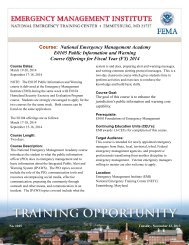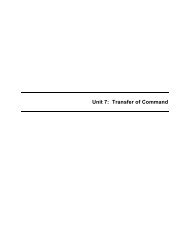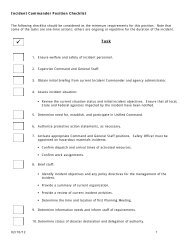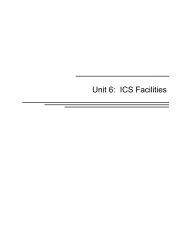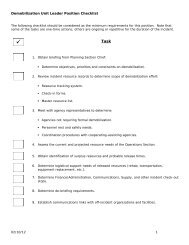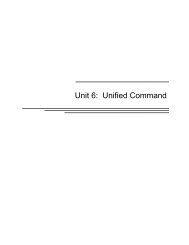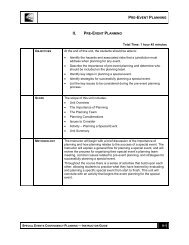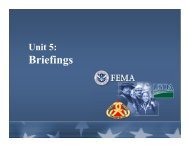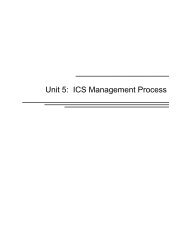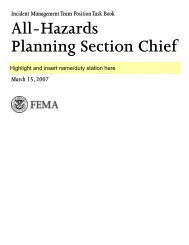enrollment for emi courses - Emergency Management Institute ...
enrollment for emi courses - Emergency Management Institute ...
enrollment for emi courses - Emergency Management Institute ...
Create successful ePaper yourself
Turn your PDF publications into a flip-book with our unique Google optimized e-Paper software.
EmE r g E n c y ma n a g E m E n t In s t I t u t E • 2010-2011 • ca t a l o g of co u r s E s<br />
• Identify each agency involved in incident<br />
management activities to ensure appropriate<br />
situational awareness and resources status<br />
in<strong>for</strong>mation is shared through multi-agency<br />
coordination.<br />
• Identify typical priorities established between<br />
elements of the Multi-Agency Coordination<br />
System.<br />
• Define key terms related to the Multi-Agency<br />
Coordination System.<br />
• Describe the process of acquiring and allocating<br />
resources required by incident management<br />
personnel in relationship to the entire Multi-<br />
Agency Coordination System.<br />
• Identify typical future resource requirements <strong>for</strong><br />
the entire Multi-Agency Coordination System.<br />
• Identify potential coordination and policy issues<br />
arising from an incident relative to the entire<br />
Multi-Agency Coordination System.<br />
The primary functions of Multi-Agency Coordination<br />
Systems addressed in the course are: to support incident<br />
management policies and priorities; facilitate logistics<br />
support and resource tracking; make in<strong>for</strong>med resource<br />
allocation decisions using incident management<br />
priorities; coordinate incident managementrelated<br />
in<strong>for</strong>mation; and coordinate interagency<br />
and intergovernmental issues regarding incident<br />
management policies, priorities, and strategies.<br />
There also is a group study version of this course by<br />
which it may be delivered in the classroom.<br />
CEUs: .5<br />
Study Hours: 5<br />
national Incident management system<br />
(nIms) public In<strong>for</strong>mation systems<br />
(Is 702)<br />
The public in<strong>for</strong>mation systems described in<br />
NIMS are designed to effectively manage public<br />
in<strong>for</strong>mation at an incident, regardless of the size<br />
and complexity of the situation or the number of<br />
entities involved in the response. The goal of this<br />
159<br />
course is to facilitate NIMS compliance by providing<br />
participants with the basic in<strong>for</strong>mation and tools<br />
that they need to apply the NIMS public in<strong>for</strong>mation<br />
systems and protocols during incident management.<br />
This course is designed <strong>for</strong> local and State public<br />
in<strong>for</strong>mation officers.<br />
CEUs: .3<br />
Study Hours: 3<br />
national Incident management system<br />
(nIms) resource management (Is 703.a)<br />
This interactive computer-based course provides<br />
the principles, tools, processes, and systems used in<br />
NIMS that incident managers need <strong>for</strong> timely and<br />
effective resource management during an incident.<br />
Primary tasks addressed in this course are:<br />
• Establishing systems <strong>for</strong> describing, inventorying,<br />
requesting, and tracking resources;<br />
• Activating these systems prior to and during an<br />
incident;<br />
• Dispatching resources prior to and during an<br />
incident; and<br />
• Deactivating or recalling resources during or<br />
after incidents.<br />
The course shows that resources, including<br />
personnel, teams, facilities, equipment, and<br />
supplies, are managed through NIMS by advance<br />
planning, resource identification and ordering,<br />
categorizing resources, use of agreements,<br />
acquisition management, management in<strong>for</strong>mation<br />
systems, and protocols <strong>for</strong> ordering, mobilization,<br />
and dispatching.<br />
This course will supersede G276, Resource <strong>Management</strong>.<br />
For purposes of the APS, those who have completed<br />
G276 may still claim credit <strong>for</strong> it as an elective, or IS<br />
703.a will count toward that elective.<br />
There also is a group study version of this course by<br />
which it may be delivered in the classroom.<br />
CEUs: .3<br />
Study Hours: 3<br />
FEd E r A L Em E r g E N C y mA N A g E m E N T Ag E N C y<br />
InDEpEnDEnt stuDy<br />
cOursEs



